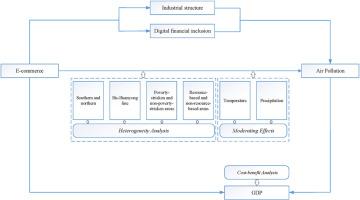电子商务与空气污染:来自中国的证据
IF 9.7
1区 环境科学与生态学
Q1 ENGINEERING, ENVIRONMENTAL
引用次数: 0
摘要
电子商务是数字经济和实体经济之间的重要纽带,对收入增长有积极的促进作用。面对资源约束和严重的环境污染,研究电子商务的环境效应同样具有现实意义。本研究基于中国2011年至2018年的县域面板数据,采用差分(DID)模型研究农村电子商务示范县(REDC)政策对大气污染的影响。研究发现,示范县政策加剧了县域空气污染,且污染效应具有区域异质性。此外,气温和降水的增加削弱了示范政策的污染效应。机制分析表明,示范政策可促进县级第二产业和数字普惠金融的发展,进而导致当地空气质量的恶化。对成本和收益的进一步分析表明,示范政策带来的显著正面经济效应远远超过了空气污染造成的间接经济损失。因此,地方政府在积极推动农村地区电子商务发展的同时,也应高度重视其潜在的环境负外部性。本文章由计算机程序翻译,如有差异,请以英文原文为准。

E-commerce and air pollution: Evidence from China
E-commerce serves as an important link between the digital economy and the real economy, and contributes positively to income growth. In the face of resource constraints and serious environmental pollution, it is equally relevant to examine the environmental effects of e-commerce. Based on county panel data for China from 2011 to 2018, this study uses a difference in differences (DID) model to investigate the impact of Rural E-Commerce Demonstration County (REDC) policy on air pollution. This study reveals that the demonstration policy exacerbates air pollution in counties and the pollution effect is regionally heterogeneous. Additionally, the increase in temperature and precipitation weakens the pollution effects of the demonstration policy. Mechanism analysis indicates that the demonstration policy can promote the development of the secondary industry and digital financial inclusion at the county level, which subsequently leads to the deterioration of local air quality. Further analysis of costs and benefits reveals that the significant positive economic effects resulting from the demonstration policy far outweigh the indirect economic losses caused by air pollution. Therefore, when local governments actively promote the development of e-commerce in rural areas, they should also attach great importance to its potential negative environmental externalities.
求助全文
通过发布文献求助,成功后即可免费获取论文全文。
去求助
来源期刊

Journal of Cleaner Production
环境科学-工程:环境
CiteScore
20.40
自引率
9.00%
发文量
4720
审稿时长
111 days
期刊介绍:
The Journal of Cleaner Production is an international, transdisciplinary journal that addresses and discusses theoretical and practical Cleaner Production, Environmental, and Sustainability issues. It aims to help societies become more sustainable by focusing on the concept of 'Cleaner Production', which aims at preventing waste production and increasing efficiencies in energy, water, resources, and human capital use. The journal serves as a platform for corporations, governments, education institutions, regions, and societies to engage in discussions and research related to Cleaner Production, environmental, and sustainability practices.
 求助内容:
求助内容: 应助结果提醒方式:
应助结果提醒方式:


